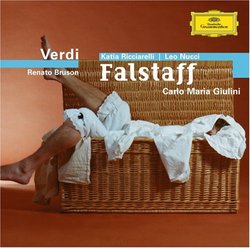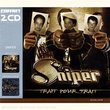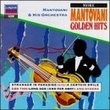Hit the road, Jack, and don't you come back no more, no more
L. E. Cantrell | Vancouver, British Columbia Canada | 10/31/2007
(3 out of 5 stars)
"SOURCE: Live performance offered as part of the regular Los Angeles Symphony season on April 13, 1982.
SOUND: Live 1980s digital stereo. Audience applause has effectively been edited out, although some laughter appear in mid-performance. I have not heard this new re-issue, but on the earlier full-price version, the orchestra sounded more crisp than any I've ever heard on a recording of "Falstaff." Solo voices came across very nicely. On the other hand, the many ensembles tended to be ground into a nearly indecipherable mush. Why this should be, I can't fathom, but even the first complete recording under Lorenzo Molajoli, dating from 1932, does more justice to Verdi's magnificent vocal interplays. (I played the old set--which I have criticized here in Amazon for its poor sound--after hearing this one, just to confirm that memory hadn't played me false.) I have no reason to believe that this re-issue is appreciably different.
If you are the kind of fan that regards an opera as a symphonic score burdened with a vocal line, this is the set for you. Otherwise beware of a recording that betrays the very thing that makes "Falstaff" uniquely brilliant.
CAST: Sir John Falstaff - Renato Bruson (baritone); Mistress Alice Ford - Katia Ricciarelli (soprano); Mistress Page - Brenda Boozer (mezzo-soprano); Mistress Quickly - Lucia Valentini Terrani (mezzo-soprano); Nannetta Ford - Barbara Hendricks (soprano); Ford / Signor Fontana - Leo Nucci (baritone); Master Fenton - Dalmacio Gonzalez (tenor); Bardolfo - Francis Egerton (tenor); Pistola - William Wildermann (baritone); Doctor Cajus - Michael Sells (tenor).
CONDUCTOR: Carlo Maria Giulini with the Los Angeles Philharmonic Orchestra and the Los Angeles Master Chorale.
DOCUMENTATION: No libretto. On the assumption that this issue is consistent with other issues in the series, there is a pretty good and lengthy synopsis of the plot tied into the track list.
COMMENTARY: I take exception to an Amazon reviewer who dealt with an earlier issue of this recording by saying, "`Falstaff' is not Verdi's greatest work, but it is undeniably a masterpiece." I say that `Falstaff is Verdi's greatest work (although, alas, not his most popular), and it is undeniably a masterpiece, but this recording is a mediocre rendition of it. In fact, the only recording I can name that is worse than this one is that ghastly train wreck with Dietrich Fischer-Dieskau in the title role.
The first thing obviously wrong with this "Falstaff" is the selection of Renato Bruson to portray Sir John. Bruson is a good, sound baritone. He is more than adequate in most things and admirable in some things. Old Jack Falstaff, however, is as far beyond his reach as King Lear is to Jerry Lewis. If I had been the producer of this recording, I might have given him a try at Ford but it would never have entered my mind to associate him with Falstaff. Only Dietrich Fischer-Dieskau among the famous baritones of the 1980s would have been a dumber choice. On this set he sounds like a competent lyric baritone singing the notes well enough, but no more. In no way does he inhabit the role and become Vecchio John in the way that Valdengo did in the 1940s, Gobbi in the 1950s and Taddei in the 1960s.
Leo Nucci will forever be a journeyman baritone, good enough, never memorable, always a second choice at best. His Ford is good enough, but not memorable in any way, when measured against his recorded predecessors.
Katia Ricciarelli is all right as Alice Ford, but light-voiced in a role that ideally should have some Tebaldi-like vocal heft. (Tebaldi played the part and may be heard on a pirate recording with Tito Gobbi.) On purely vocal considerations, I'd have cast her as Nannetta, not Mistress Ford.
Barbara Hendricks as Nannetta is the best piece of casting in this production. Good as she is, she does not quite match the extraordinary competition offered by Anna Moffo and Lina Pagliughi in earlier recordings. She was typically a soubrette, but sometimes she unexpectedly exhibits enough vocal weight to make me think that she might have been a better choice than Ricciarelli for Alice Ford.
Lucia Valentini Terrani is a good enough singer but not even close to the same acting league as her predecessors as Mistress Quickly. Gonzalez is a satisfactory Fenton. Boozer and Sells are fine in their small parts. Egerton and Wildermann are just flat-out terrible as Bardolfo and Pistola, each worse than the other.
The well-recorded orchestra sounds fine, but the conducting lacks the snap and fire and ... yes, life that Molajoli, Toscanini and Karajan conjured up in such great abundance.
This is a barebones, bargain-priced re-issue of Giulini's "Falstaff" from Deutsche Grammophon (which I persist in thinking of as DGG for Deutsche Grammophon Gesellschaft.) With a couple of notable exceptions, the whole line of DG operas was a very pallid alternative for the much better offerings from EMI, Decca and--yes!--even creaky, harsh but endearingly authentic CETRA. It is an adequate recording of "Falstaff," but it competes with magnificent recordings from Toscanini and Karajan, as well as very good ones from other conductors. Even at the bargain price, it's not much of a bargain.
Three inexpensive but merely adequate stars."



